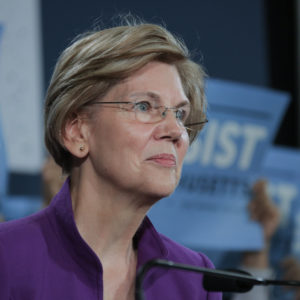When the Department of the Interior overturned an Obama-era decision and ruled against a casino project for the Massachusetts-based Mashpee Wampanoags last year, Sen. Elizabeth Warren called the president out by name.
“Today’s action by the Trump Administration is yet another deal the federal government is reneging on with Native Americans,” the Massachusetts senator said in a statement. “And it underscores why Congress must pass our legislation: so that the Mashpee Wampanoag do not lose their home at the hands of the federal government.”
So imagine how surprised some GOP observers were last week when the “Warren Casino” bill passed out of a key House committee and appeared to be headed to passage by the full House—with Republican help.
Last Wednesday the House Natural Resources Committee voted out H.R. 312, the Mashpee Wampanoag Tribe Reservation Reaffirmation Act by a vote os 26-10, including three Republicans. And now the bill is being rushed to the full House for a vote possibly as soon as this Wednesday, reportedly with at least the acquiescence, if not the open support, of Republican leadership.
Progress on this bill, sometimes called the “Warren Casino Bill,” comes despite ongoing questions surrounding both the Mashpee tribe—whose leadership is currently embroiled in a financial scandal—and Genting Malaysia, the multinational gaming conglomerate that has already invested close to half a billion dollars in the project. Genting has also been linked to a political scandal in Malaysia that helped topple the government in Kuala Lumpur last year.
Republicans opposing the casino are asking why Congress would want to move forward on such a troubled project, particularly given its connections to infamous DC moneyman and lobbyist Jack Abramoff.
Rep. Bruce Westerman (R-Ark.) reminded the committee on Wednesday that the Mashpees “have a settlement agreement with AtMashpee LLC, the illegal fund that the tribe and Jack Abramoff used to make fraudulent campaign contributions to illegally influence members of Congress, eventually landing Abramoff, the tribal chairman [Glenn Marshall] and others in jail.
“If this bill passes and the resort casino in Taunton comes to fruition, it’s very likely the tribe will pay back atMashpee LLC with profits of the casino,” Westerman said. “Is the committee comfortable with this?”
And Abramoff’s connections are hardly ancient history. Genting has paid millions to the law firm Dentons US to push the Mashpee project, and Dentons has used part of that money to hire the lobbying firm of former GOP Rep. Richard Pombo—better known as Jack Abramoff’s go-to congressman at the height of the scandal.
And then there’s the Warren factor. Sen. Elizabeth Warren’s struggles with the Native American community in the wake of her debunked claims to be an “American Indian —as she declared on official legal documents earlier in her law career— are well known. Once the impact of the scandal became clear, Warren launched an effort to rebuild bridges with Native Americans, including ending her long-standing opposition to casino gambling and backing the Mashpee bill.
After the negative fallout from the release of her DNA tests—which found little if any Native American heritage—and documents from the Texas Bar showing her claiming to be an “American Indian” on an official legal registration, Warren’s standing among Native Americans fell so much that she declined to co-sponsor the Mashpee bill in the new Congress.
Still, her poll numbers have bounced up a bit in recent weeks and a win for the Mashpees could help Warren’s campaign re-gain its footing on the “Pocahontas” issue.
There are broader political issues at play as well. While the Mashpee tribe is based on Cape Cod, the land they’re trying to acquire is 40 miles away in Taunton, MA, much closer to the Rhode Island border. Not surprisingly the state of Rhode Island, which makes a significant amount of revenue from casinos, opposes the plan. In a letter to the Natural Resources Committee chairman, Rhode Island Congressmen David Cicilline and James Langevin wrote:
“Like Governor Raimondo, we are opposed to H.R. 312 because it would deliver a devastating blow to our state’s economy by allowing the Mashpee Wampanoag Tribe to build a casino on our border. The Twin River and Tiverton casinos in Rhode Island generate over $300 million in revenue, representing the third largest source of revenue for our state. Rhode Island would suffer tremendously if H.R. 312 became law.”
The Mashpee casino is also opposed by casino developer Neil Bluhm who has his own project lined up in nearby Brockton, MA. So clearly there are parochial political interests at play. But as Rep. Paul Gosar (R-Ariz) asked the committee on Wednesday:
“You put [Neil] Bluhm on one end of the scale, and Elizabeth Warren, the Dentons and a corrupt Malaysian company on the other –what tips the scale?”



